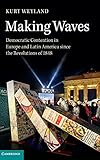Making waves : democratic contention in Europe and Latin America since the revolutions of 1848 / Kurt Weyland, University of Texas at Austin.
Material type: TextPublication details: Cambridge ; New York : Cambridge University Press, 2014.Description: x, 318 p. ; 23 cmISBN:
TextPublication details: Cambridge ; New York : Cambridge University Press, 2014.Description: x, 318 p. ; 23 cmISBN: - 9781107044746 (hardback)
- 9781107622784 (paperback)
- Government, Resistance to -- Europe -- History -- 19th century
- Government, Resistance to -- Europe -- History -- 20th century
- Government, Resistance to -- Latin America -- History -- 20thth century
- Regime change -- Europe -- History -- 19th century
- Regime change -- Europe -- History -- 20th century
- Regime change -- Latin America -- History -- 20th century
- Democracy -- Europe -- History -- 20th century
- Democracy -- Latin America -- History -- 20th century
- Europe -- Politics and government -- 19th century
- Europe -- Politics and government -- 20th century
- Latin America -- Politics and government -- 20th century
- POLITICAL SCIENCE / General
- 20150900
- 321.09/094
- JN 10 W548m 2014
| Item type | Current library | Home library | Collection | Shelving location | Call number | Vol info | Copy number | Status | Barcode | |
|---|---|---|---|---|---|---|---|---|---|---|
 Libro
Libro
|
Biblioteca Juan Bosch | Biblioteca Juan Bosch | Ciencias Sociales | Ciencias Sociales (3er. Piso) | JN 10 W548m 2014 (Browse shelf(Opens below)) | 1 | 1 | Available | 00000113271 |
"This study investigates the three main waves of political regime contention in Europe and Latin America. Surprisingly, protest against authoritarian rule spread across countries more quickly in the nineteenth century, yet achieved greater success in bringing democracy in the twentieth. To explain these divergent trends, the book draws on cognitive-psychological insights about the inferential heuristics that people commonly apply; these shortcuts shape learning from foreign precedents such as an autocrat's overthrow elsewhere. But these shortcuts had different force, depending on the political-organizational context. In the inchoate societies of the nineteenth century, common people were easily swayed by these heuristics: Jumping to the conclusion that they could replicate such a foreign precedent in their own countries, they precipitously challenged powerful rulers, yet often at inopportune moments -- and with low success. By the twentieth century, however, political organizations had formed. Their leaders had better capacities for information processing, were less strongly affected by cognitive shortcuts, and therefore waited for propitious opportunities before initiating contention. As organizational ties loosened the bounds of rationality, contentious waves came to spread less rapidly, but with greater success"-- Provided by publisher.
Includes bibliographical references and index.
Machine generated contents note: 1. Introduction: puzzling trends in waves of contention; 2. A new theory of political diffusion: cognitive heuristics and organizational development; 3. Organizational development and changing modes of democratic contention; 4. The tsunami of 1848: precipitous diffusion in inchoate societies; 5. The delayed wave of 1917-19: organizational leaders as guides of targeted contention; 6. The slow but potent 'third wave' in South America: the prevalence of negotiated transitions; 7. Crosscurrents of the third wave: inter-organizational competition and negotiation in Chile; 8. Theoretical conclusions and comparative perspectives.
There are no comments on this title.

